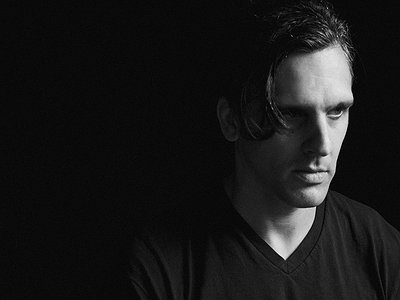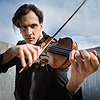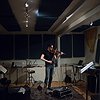Do you feel it important that an audience is able to deduct the processes and ideas behind a work purely on the basis of the music? If so, how do you make them transparent?
The only really musical processes are the ones in the music. The needlepointed design doesn’t exist on the back of the fabric. I don’t need the audience to know that I use a Rotring mechanical pencil to scratch out my notes any more than I need an audience to know I avoided recursion when programming my software effect. If a process is musically important then it needs to be built into the musical experience.
For example, all my electronic sounds are triggered by some physical gesture: kicking a drum, playing the violin, etc. I don’t need the audience to know technical details, but I do know this simple gestural connection is effective for listeners. I think it works well because, on a fundamental level, the music requires it. The time is so free that I need to be able to control all the events according to my own rubato, how the room is sounding, etc. This is what keeps things live, and the fact that all the sounds are gestural is just an indistinguishable requirement of that whole musical picture. That’s what counts for an audience.
With more and more musicians creating than ever and more and more of these creations being released, what does this mean for you as an artist in terms of originality? What are some of the areas where you currently see the greatest potential for originality and who are some of the artists and communities that you find inspiring in this regard?
It’s not an artist’s job to be original; it’s their job to be good. Being original is a concept of the moment that may make an artist’s work more “important” within some ephemeral historical narrative but it’s not something an individual can sincerely strive toward and thus it’s not their responsibility.
The only way to be original is to firstly be an original person with original ideas, and secondly to allow yourself to clear out the noise of society (including labels like “original”) and just go as deep into yourself as possible to pull those ideas out in as unadulterated a form as possible. The first one is hard to ever know and the second we should be doing anyway.
How would you define the term “interpretation”? How important is it for you to closely work together with the artists performing your work?
I think of interpretation as a physical realization in dialogue with the conceptual work of the composition. The work exists as a conceptual piece after being composed, but only there. A performer creates a physical interpretation in dialogue with your composition. The dialogue is necessarily between the performer’s own ideas, assumptions, biases and the topics presented by the composition. Like any good dialogue if either party isn’t being very clear the results can get muddled. This is first and foremost what being a great performer is about: being great at this process.
I’ve seen this in action. Work with a group like A Far Cry string orchestra for 15 minutes and you’ll be amazed to learn how much there is to “discuss” regarding your composition. The best performers really marry themselves to your work and it’s a poor composer that doesn’t give her away lovingly at the altar. I like to be personally part of the process when possible if only just to witness the magic; I try to butt out as much as I can so the performers don’t feel some obligatory deference to me. It’s their work now, and if I can help facilitate that transition into their care, all the better.
The effect of a piece doesn't merely depend on the performance of the musicians, but also on the place it is performed at. How do you see the relationship between location and sound? In how far do you feel the current system of concert halls is still the right one for your music – or for contemporary music in general?
I actually thought deeply about this fact before writing the music on this record. I decided the native space for this music would be the ubiquitous club environment. These clubs are designed around this incredible modern instrument - the full range sound system - just like churches are designed around their organ. I decided I was going to transform these rock venues into cathedrals by hijacking the power of this instrument for my own means. As composers we can’t physically change the venues but we can create music that psychically reclaims them.
The canonical event I had in mind was a big beautiful chord followed by a bunch of white space while the room soaked it all in, like the opening to Dead Letter Library. The popular music that usually fills these clubs can’t tolerate silence. Popular music is afraid of silence; it’s like their advertising dollars are going down the drain for every second wasted. I knew the effect of a spacious, consonant work played at real volume with subs engaged would make a fantastic, ear-opening impact.
Context is a key part of how we listen to music and musicians rarely think about this largely because we often have such little control over this aspect. Certain types of music just don’t work in certain places. Echoey, loud rooms don’t do nuanced counterpoint; they’re built for homophonic textures. By the same token, classical venues have this addiction to this dry, lights-on aesthetic. Maybe it’s to facilitate people reading the ads they stuff in with the program notes. I want people engaged with the other part of their brain, the one they use to connect sensually with music.
The best environment is the one where the audience really feels in it together with the performer. That seems to happen most at DIY lofts where there is no “safe distance” between you and the audience: they’re part of it.
What's your view on the role and function of music as well as the (e.g. political/social/creative) tasks of composers today - and how do you try to meet these goals in your work?
I’d never been interested in making a solo record before this one. Writing for others is really different than writing for yourself, up there alone. For me, the process really involved asking what kind of person I wanted to be up there on stage, which immediately insisted on knowing what kind of person I wanted to be in general. I’m not up there to do theater. So the music asked me some hard questions about what characters were natural to me and what ideas I felt were worth sharing. These are all the right questions for art in general so I felt I was on to something. The thing started to take the form of a secular ritual as sacred musical textures started appearing. For me this was the only honest way to make a social statement with music, or otherwise: to try and rigorously lead by example.
Do you have a musical vision that you haven't been able to realise for technical or financial reasons – or an idea of what music itself could be beyond its current form?
When I was in my twenties I had an idea called “Music at Sea” wherein I, and some companions, would charter a small ship with a studio set-up in the hull and record an album while sailing around South America or some such. Certainly the ambient ocean noise and creaking of the hull would make it onto the tape. We’d occasionally port to play shows at various cities along the way. We’d all also have to share all the duties of seamanship as well. Not for the faint of heart! I’ve always been into the deep, inescapable immersive experience, the ones that push at you. We’d figure out what kind of music this should be as part of the experience of living and working on this vessel. Essentially the goal would be to create a kind of habitual music native to our life at sea, not unlike rigging the main sail.
Who knows if this romantic tale would actually be a good idea in practice or fare better left out at sea, as some nautical dream.




